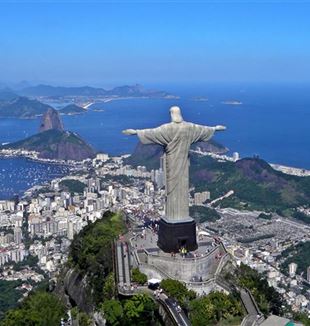
Rio de Janeiro: Looked at like the apostles
Is it possible to feel loved in a totally disinterested way? Often we can't even look at our children in this way... But when it happens, it's a point of no return.When I read the text of School of Community, I was immediately struck by the first sentence: "In the Simplicity of my Heart I have gladly given You everything”. I thought it was a phrase for Fr. Giussani’s for the people of Communion and Liberation... Then I discovered that it was a prayer that he often repeated. Immediately afterwards, this question follows: “What is man that you should keep him in mind, mortal man that you care for him?” If I didn’t have the example of Fr. Carrón before my eyes, I would say that it's impossible to believe that a gaze can be so disinterested and, at the same time, is so profound and truly interested in me. This was evident after the presentation of his book Dov’è Dio? [Where is God?], here in the city, but also through the way in which Carrón speaks to us and faces the problems of the movement, of the Church, everything…If I didn't have that example before my eyes, I wouldn’t believe that it were possible to have such a gaze upon me!
I realize that I don't even have this gaze towards my children, because towards them too, in the end, I have an interested look: I want them to do this or that, I want them to stop crying, to stop sleeping, that they do well at school…If I’m able to have that gaze towards them (which is the most gratuitous relationship that exists) how can there be someone else who looks at me like that? It seems as though Carrón doesn’t care if we follow him or the organization of the movement... Deep down, he only cares about our person, and, for me, this is the only way to overcome nihilism, because I can only go after something that is true to its very depth. That's what we were talking about: that nihilism is like a leaf at the mercy of the wind... If I participate in a certain place and I realize that behind it there is a certain interest: to create followers, a political identity, a lifestyle, etc., I run away!
For me, this is the only place where I am looked at in this disinterested way and, therefore, I have no reason to run away. It is a gaze that makes me overcome nihilism: without it I would continue to jump from branch to branch, from philosophy to philosophy. It’s impossible not to follow such a gaze! I think of the experience of John and Andrew, when Fr. Giussani recounts their encounter with Christ. It seems, to me, that he is describing precisely this dynamic. What makes me come here to School of Community and to follow the gestures of the movement is the same thing that made John, Andrew, and then Peter, follow Jesus: a gaze upon me that is so disinterested that it makes me more myself. I only feel free when I am totally embraced for what I am and not for what I should be. How must Simon have felt when he was looked at, down into his soul, to the point of being called Peter?
This is the place that really takes care of me, that looks at me in the same way that Peter was looked at. There are moments that are absolutely clear, where it becomes evident that Another is present, moments that could not happen if it were not for this Other... It might be a dinner, being with a friend, a dialogue, reading a text, a School of community, a vacation, a Fraternity group, moments in which I feel as though I could be there for the rest of my life, as if everything around me did not matter... They are moments in which I can really go to the bottom of what I am, my questions, my heart... everything... They are like moments of total correspondence.
It seems to me that the apostles encounter was exactly like this, a moment in which that gaze, that person, was everything in their lives. Then came their fishing, their wives, their children, but that gaze was the fulcrum of their life. I think that heaven must be that moment extended into eternity; only that moment. It’s incredible to see how those moments determine my life and my way of doing things. For example, I like to cook because it's always been a way in which I can make Him happen, as well as helping to organize a holiday or moments together. It's as if that’s the work needed to make that moment possible. When I lose sight of this, effort, problems, the character of each of us, come to the surface and everything becomes impossible. But it's enough to remember these moments and everything moves back into place. It is these fragments of the School of Community, friends, people, texts that make it clear to me that I want to be there and nowhere else. This passage about John and Andrew made me realize how beautiful it is to be completely magnetized by this gaze, which makes me live the hundredfold in life.
Luca, Rio de Janeiro, Brazil